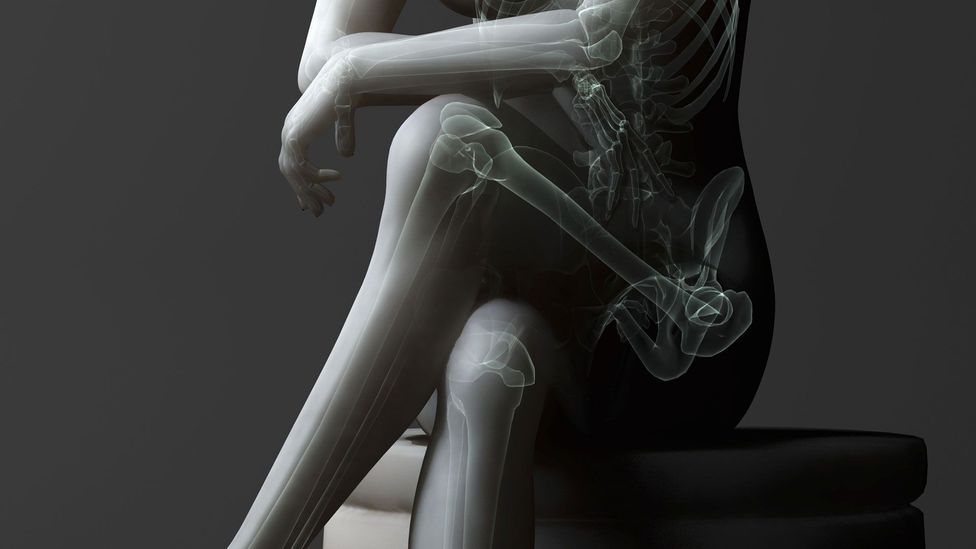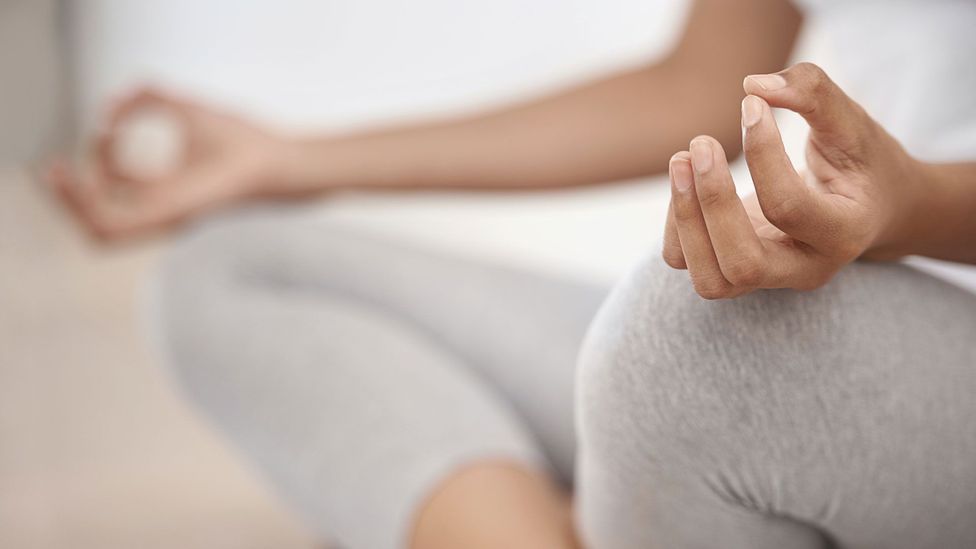Why Can I See My Veins in My Legs
Is crossing your legs bad for y'all?
(Image credit:
Getty Images
)

Should you avert sitting on a chair with your legs crossed?
H
How exercise yous similar to sit down on a chair? Many people prefer to cross ane leg over the other. In the 1980s, British comedian Kenny Everett even made it his trademark – extravagantly crossing, uncrossing, so recrossing his legs while dressed in a skirt and high heels, declaring it was "all in the best possible gustation".
Others adopt non to cross their legs at all and fifty-fifty to "man spread" as it's become known, sitting with their knees wide apart on public transport while the people either side of them are squashed. These men might take liked a rather curious publicity campaign launched in the Us in 1999 called "The Cracking Cross-Out" where a dietary supplement visitor encouraged people to keep good for you by non crossing their legs for a whole day.
But is it really whatever healthier to avoid crossing your legs? The list of suggested consequences of spending too much fourth dimension with one knee joint crossed over the other includes raised claret pressure, varicose veins and nerve impairment, merely each of these deserves close test.

Crossing the legs can put pressure on the peroneal nervus at the dorsum of the articulatio genus, which supplies sensation to the lower legs and anxiety (Credit: SPL)
Of course it is true that if you lot spend too much time in exactly the same position, eventually your leg or your foot can go numb. This is because crossing the legs can put pressure level on the peroneal nerve behind the human knee, which supplies sensation to the lower legs and feet. But if you do give yourself pins and needles this way, information technology is only temporary.
Maintaining a particular posture for many, many hours tin however atomic number 82 to a status called peroneal nervus palsy resulting in "foot drop" where you can't lift the front part of your human foot and toes. Just when a study from South Korea examined a series of patients' notes in order to identify the chief causes, sitting on a chair with ane knee over the other didn't feature. Sitting cross-legged on the floor for hours at a time did. In reality long term numbness is an unlikely consequence of leg-crossing because as soon equally we feel uncomfortable we tend to move.

Sitting cross-legged on the flooring for hours at a fourth dimension causes numbness (Credit: iStock)
So how about blood pressure? When you get information technology checked, the doctor or nurse tends to ask you to rest your arm on the chair or tabular array and to uncross your legs, putting your anxiety apartment on the floor. The fear is that crossed legs might skew the reading by temporarily raising your blood pressure. By 2010, seven studies had indeed found that leg crossing does result in a college blood pressure reading, while another study plant it made no divergence. All the same, many of these studies were small and relied on taking a blood pressure level reading just one time. One of the larger studies was conducted at a hypertension dispensary in Istanbul. Researchers at that place took several readings with legs crossed and uncrossed. Again, blood pressure was higher when legs were crossed, only crucially when the measurements were repeated just iii minutes after uncrossing the legs, blood pressure was back to the earlier levels. The greatest ascent in blood pressure level occurs in people already being treated for high blood force per unit area.
Two possible mechanisms accept been proposed to explain why leg-crossing might atomic number 82 to a temporary rise in blood pressure level. One is that the action of putting one knee over the other sends claret from the legs up to the chest resulting in an increased quantity of blood existence pumped out of the heart, raising blood pressure. An alternative caption is that blood pressure rises because isometric exercise of the leg muscles (exercise without the joints moving) increases the resistance to the blood passing through the vessels. This might explicate why crossing legs at the ankles doesn't have the same effect.

Crossing legs at the ankles doesn't cause a rising in blood pressure, but it tin can at the knee joint (Credit: iStock)
In social club to institute which of these explanations was the most likely, a study in Nijmegen in the Netherlands took a number of physiological measurements. The squad found that resistance in the blood vessels didn't rise when the centre charge per unit was low and the legs were crossed, just the amount of blood leaving the heart did, suggesting that the increased claret pressure is due to crossed legs pushing blood up to the heart.
So crossing the legs does appear to cause a temporary rising in blood pressure, but the evidence for any long-term consequences simply isn't in that location, with one exception. People at high risk of claret clots are advised not to cross their legs for long periods of time considering for them, impeding the flow of blood could increase their run a risk of a deep vein thrombosis.
But even if crossing your legs doesn't requite you lot loftier blood pressure in the long term, what about the idea that it can give you varicose veins? The reasons why some people suffer from varicose veins and others don't is something of a mystery. Usually tiny valves in the blood vessels forestall claret from flowing dorsum in the wrong direction, simply if those valves become stretched and weakened the blood can pool, resulting in the enlarged veins we call varicose veins. Crossing the legs has not been demonstrated to be a crucial gene. Whether or non you go varicose veins seems, partly at to the lowest degree, to be downwardly to genetics.
So if veins, claret force per unit area and nerves are not affected past leg-crossing in the long-term, how almost the impact on our joints? One study plant that people who sat with their legs crossed for more than three hours a day were more likely to lean forward and to circular their shoulders. But the research relied on people's own estimations of how long they crossed their legs for. Every bit I write this, I'm sitting at my desk and happen to have my legs crossed, but I would have no idea how many hours a day I spend sitting in this mode. More contempo research published this year found that if people were instructed to sit down upwards direct while they crossed their legs the postural issues were overcome. Of grade whether that'south maintained when y'all take no experimenter standing over you is another matter. Incidentally most twice equally many people reported crossing their correct leg over their left knee than the other way around.

Crossed legs might bring some benefits, edifice certain muscles (Credit: iStock)
Slouching doesn't audio adept, but if you are fan of leg-crossing, you might like a rather curious written report from the University Medical Middle in Rotterdam which found that it could bring benefits. Researchers examined young men and women every bit they sat with their legs either straight, crossed at the knee or crossed at both the knee and the talocrural joint at one time. They and so simulated the exact angles of the posture in four embalmed pelvises, which allowed them to measure out exactly what our muscles do when nosotros cross our legs. They found that crossing the legs at the knee increased elongation in the piriformis muscle running backside the hip joint by 11% when compared with sitting with legs uncrossed, and by 21% when compared with standing (interestingly the tension was slightly less if the legs were crossed at the talocrural joint too). The authors believe that this increases stability in their pelvic joints in a like way to tensing the intestinal muscles does.
So if you similar crossing your legs Kenny Everett-fashion then you're unlikely to do yourself whatsoever impairment, provided yous don't stay in the same position until your legs are numb. And whoever is sitting adjacent to yous on the charabanc or the train will exist grateful to yous for taking up less room than the man-spreaders.
Follow united stateson Facebook , Twitter , Google+ , LinkedIn and Instagram .
Source: https://www.bbc.com/future/article/20151013-is-crossing-your-legs-bad-for-you
0 Response to "Why Can I See My Veins in My Legs"
Post a Comment